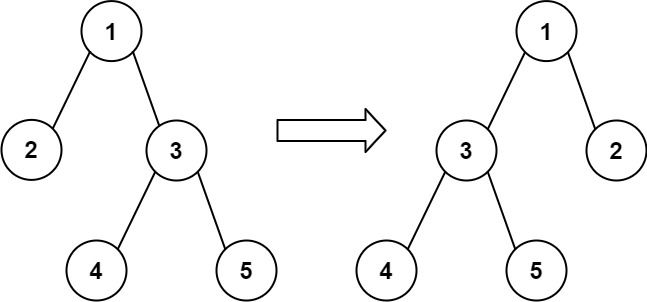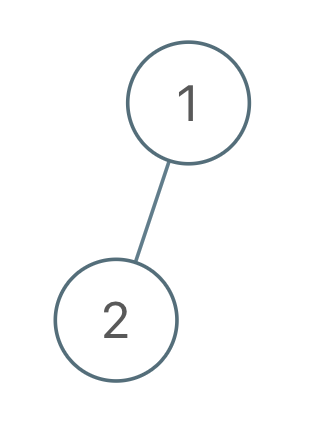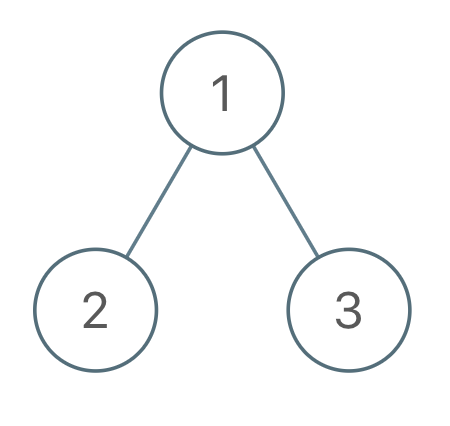Welcome to Subscribe On Youtube
971. Flip Binary Tree To Match Preorder Traversal
Description
You are given the root of a binary tree with n nodes, where each node is uniquely assigned a value from 1 to n. You are also given a sequence of n values voyage, which is the desired pre-order traversal of the binary tree.
Any node in the binary tree can be flipped by swapping its left and right subtrees. For example, flipping node 1 will have the following effect:

Flip the smallest number of nodes so that the pre-order traversal of the tree matches voyage.
Return a list of the values of all flipped nodes. You may return the answer in any order. If it is impossible to flip the nodes in the tree to make the pre-order traversal match voyage, return the list [-1].
Example 1:

Input: root = [1,2], voyage = [2,1] Output: [-1] Explanation: It is impossible to flip the nodes such that the pre-order traversal matches voyage.
Example 2:

Input: root = [1,2,3], voyage = [1,3,2] Output: [1] Explanation: Flipping node 1 swaps nodes 2 and 3, so the pre-order traversal matches voyage.
Example 3:

Input: root = [1,2,3], voyage = [1,2,3] Output: [] Explanation: The tree's pre-order traversal already matches voyage, so no nodes need to be flipped.
Constraints:
- The number of nodes in the tree is
n. n == voyage.length1 <= n <= 1001 <= Node.val, voyage[i] <= n- All the values in the tree are unique.
- All the values in
voyageare unique.
Solutions
-
/** * Definition for a binary tree node. * public class TreeNode { * int val; * TreeNode left; * TreeNode right; * TreeNode() {} * TreeNode(int val) { this.val = val; } * TreeNode(int val, TreeNode left, TreeNode right) { * this.val = val; * this.left = left; * this.right = right; * } * } */ class Solution { private int i; private boolean ok; private int[] voyage; private List<Integer> ans = new ArrayList<>(); public List<Integer> flipMatchVoyage(TreeNode root, int[] voyage) { this.voyage = voyage; ok = true; dfs(root); return ok ? ans : List.of(-1); } private void dfs(TreeNode root) { if (root == null || !ok) { return; } if (root.val != voyage[i]) { ok = false; return; } ++i; if (root.left == null || root.left.val == voyage[i]) { dfs(root.left); dfs(root.right); } else { ans.add(root.val); dfs(root.right); dfs(root.left); } } } -
/** * Definition for a binary tree node. * struct TreeNode { * int val; * TreeNode *left; * TreeNode *right; * TreeNode() : val(0), left(nullptr), right(nullptr) {} * TreeNode(int x) : val(x), left(nullptr), right(nullptr) {} * TreeNode(int x, TreeNode *left, TreeNode *right) : val(x), left(left), right(right) {} * }; */ class Solution { public: vector<int> flipMatchVoyage(TreeNode* root, vector<int>& voyage) { bool ok = true; int i = 0; vector<int> ans; function<void(TreeNode*)> dfs = [&](TreeNode* root) { if (!root || !ok) { return; } if (root->val != voyage[i]) { ok = false; return; } ++i; if (!root->left || root->left->val == voyage[i]) { dfs(root->left); dfs(root->right); } else { ans.push_back(root->val); dfs(root->right); dfs(root->left); } }; dfs(root); return ok ? ans : vector<int>{-1}; } }; -
# Definition for a binary tree node. # class TreeNode: # def __init__(self, val=0, left=None, right=None): # self.val = val # self.left = left # self.right = right class Solution: def flipMatchVoyage(self, root: Optional[TreeNode], voyage: List[int]) -> List[int]: def dfs(root): nonlocal i, ok if root is None or not ok: return if root.val != voyage[i]: ok = False return i += 1 if root.left is None or root.left.val == voyage[i]: dfs(root.left) dfs(root.right) else: ans.append(root.val) dfs(root.right) dfs(root.left) ans = [] i = 0 ok = True dfs(root) return ans if ok else [-1] -
/** * Definition for a binary tree node. * type TreeNode struct { * Val int * Left *TreeNode * Right *TreeNode * } */ func flipMatchVoyage(root *TreeNode, voyage []int) []int { i := 0 ok := true ans := []int{} var dfs func(*TreeNode) dfs = func(root *TreeNode) { if root == nil || !ok { return } if root.Val != voyage[i] { ok = false return } i++ if root.Left == nil || root.Left.Val == voyage[i] { dfs(root.Left) dfs(root.Right) } else { ans = append(ans, root.Val) dfs(root.Right) dfs(root.Left) } } dfs(root) if !ok { return []int{-1} } return ans } -
/** * Definition for a binary tree node. * class TreeNode { * val: number * left: TreeNode | null * right: TreeNode | null * constructor(val?: number, left?: TreeNode | null, right?: TreeNode | null) { * this.val = (val===undefined ? 0 : val) * this.left = (left===undefined ? null : left) * this.right = (right===undefined ? null : right) * } * } */ function flipMatchVoyage(root: TreeNode | null, voyage: number[]): number[] { let ok = true; let i = 0; const ans: number[] = []; const dfs = (root: TreeNode | null): void => { if (!root || !ok) { return; } if (root.val !== voyage[i++]) { ok = false; return; } if (!root.left || root.left.val === voyage[i]) { dfs(root.left); dfs(root.right); } else { ans.push(root.val); dfs(root.right); dfs(root.left); } }; dfs(root); return ok ? ans : [-1]; }